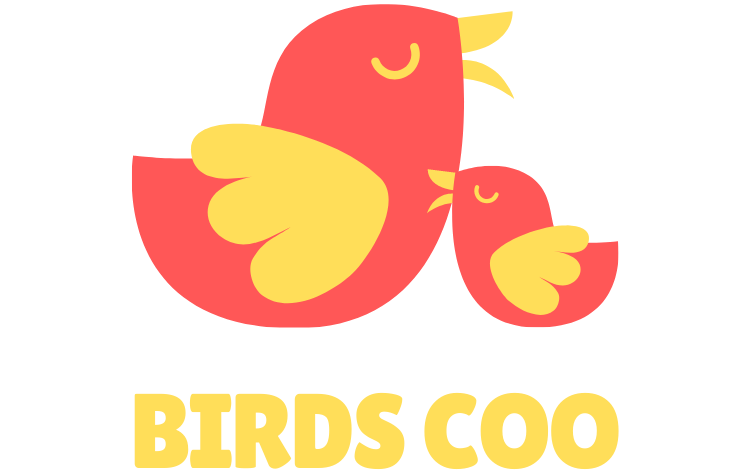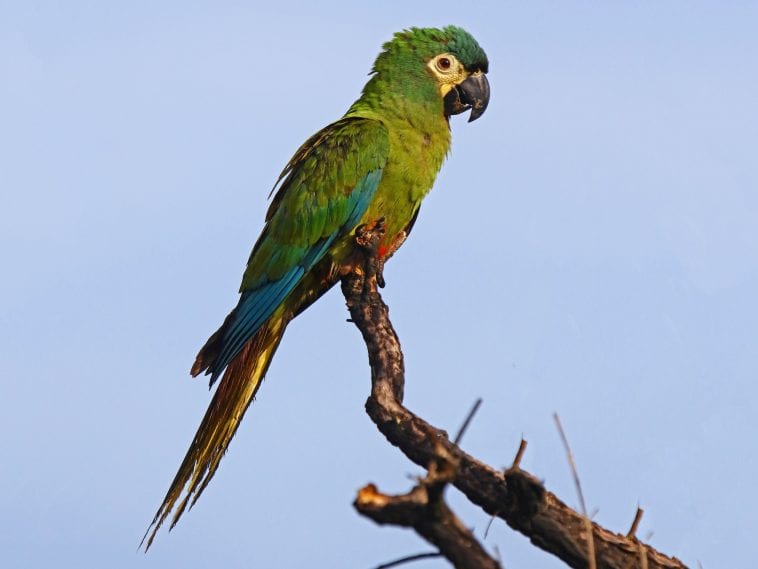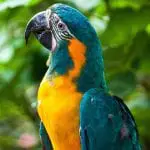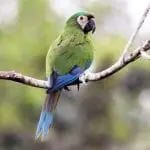Scientific Facts
| Common Name: | Blue-Winged Macaw |
| Scientific Name: | Primolius maracana |
| Life Span: | Up to 45 or more years in captivity |
| Size: | About 17 inches |
| Habitat: | Woodlands |
| Country of Origin: | South America |
Blue-Winged Macaw Information
The Blue-Winged Macaw is considered one of the most popular species of parrots that hail from South America. What makes them one of the more adored pet parrots for different kinds of owners is that they are not only beautiful to look at, but they are also very interesting due to their playfulness, and friendly demeanor.they are small to moderate in terms of size and are generally very sociable and prefer to spend time with their owner on a regular basis. They are also called Illiger’s Macaw in honor of the German ornithologist Johann Karl Wilhelm Illiger.
Physical Description
The Blue-Winged Macaw is a small to moderately-sized species of parrot that can reach lengths that are somewhere between 14 and 17 inches. In that regard, their size makes them perfect for different pet owners who prefer to keep parrots that are moderately easy to take care of from a size standpoint.
Blue-Winged Macaws are usually adorned with feathers that are of bright green color. They are predominantly green but can have all sorts of different colors decorating their feathers. Some may have colors that are yellowish to bright green. You can clearly see the bright green colors whenever the Blue-Winged Macaw is in flight. There are also those that have brownish red feathers near the belly and the tail portions of the body. The same bright red color can also be found on the forehead of this bird. But what really gave these parrots their signature names are the blue feathers that can be found not only on their wings but also on the top of their heads.
Like most parrots, the Blue-Winged Macaw has a black or dark gray beak. However, what makes it unique is that their beaks tend to be larger than what you would expect for a bird of its size. The beak also curves sharply downwards like most other parrot species.
Personality
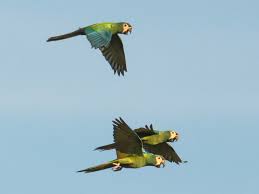
The Blue-Winged Macaw is actually a pretty enjoyable pet to have for any type of human because of its personality. Unlike other types of pet birds, this parrot enjoys social moments with other Blue-Winged Macaws and with its owner. In that regard, they are nothing short of friendly and playful. They enjoy interacting with humans and are mostly beloved due to how well they bond with their owners.
Not a lot of people know this, but the Blue-Winged Macaw is actually pretty intelligent. It understands how humans feel and how they react to certain situations. They can easily tell whether you are attentive to their needs or whether you are merely there to keep them around. In that regard, most of these birds can actually develop personalities based on how their owners care for them and based on the type of personality that is often reflected by their owners.
What can be gleaned from that is that the Blue-Winged Macaw is a very compassionate type of pet bird. It can sense and understand its owner’s demeanor and can tell whether or not he or she is sad. In that sense, the parrot will also be a reflection of the owner’s usual temperament and demeanor. So if you are usually sad, it can also follow that your Blue-Winged Macaw will follow a temperament and demeanor that is also sad due to how compassionate of a pet it is.
Life Span
In captivity, it is expected that the Blue-Winged Macaw will be able to live for more than 45 years. However, some have been recorded to have lived for 50 to 60 years old as long as they are properly taken care of in an environment that is suitable for them.
Blue-Winged Macaws living in the wild are not expected to live for as long as their captive counterparts do due to a combination of many different factors such as bacterial and parasitic infections, illnesses, deforestation, climate change, and natural predators.
Reproduction
The Blue-Winged Macaw usually reaches sexual maturity when it is about 2 to 4 years of age. That is when they will be ready for reproduction with another healthy and sexually mature Blue-Winged Macaw. After laying its eggs, the Blue-Winged Macaw will have a brooding period of about 29 days until the eggs hatch. Most of these birds will learn how to fly by the time they reach about 11 weeks and can stay with their parents for up to a year even after they have learned how to fly.
Behavior
As playful and as intelligent as the Blue-Winged Macaw is, this parrot is very friendly and sociable towards its owner. It behaves in such a way that it makes you feel like it really loves having you around for company. You can even go on to say that the Blue-Winged Macaw shows interest not only in how you feel but also in what you are doing. It will not be rare to see this parrot looking over your shoulder just to see and learn more about your activities.
If you are not around for some social interactions with the parrot or if you are too busy to do so, you will find that the Blue-Winged Macaw will easily get bored and will require something to do to get itself preoccupied. In that regard, it is always a good idea to provide it with different ways to allow it to stimulate its brain as this parrot is so intelligent that it requires mental activities.
As smart and as alert as the Blue-Winged Macaw is, this parrot will easily respond to training and tricks. You will find that you do not have to exert a lot of time and effort to provide this parrot with some basic kind of training.
The Blue-Winged Macaw is not an active talker and does not make as much noise as some other parrots do. However, they do make sounds from time to time and may often sound like crows. Some of these birds may also learn a few words, but they are not necessarily repetitive. As birds with a clown-like personality, they can be pretty surprised when it comes to answering you with interesting and funny responses.
Eating Habits
Video URL:
The one thing that should be noted about the Blue-Winged Macaw is that this parrot is great at expending energy and is more active than most other species of parrots. They tend to burn a lot of calories and are seemingly always on the go, especially when they have something to do or if they are interacting with their owners. In that regard, these social birds need to be placed under a diet that is higher in calories and fat content than most other species of parrots.
Blue-Winged macaws are primarily herbivores. In the wild, they love staying on palm and will eat almost anything edible on it. They love eating from all parts of the palm and are commonly found feeding on palm nuts. While their beaks are large and sharp, they were made for the purpose of breaking open palm nuts so that it will be quite easy for them to feed on such.
When not eating different parts of palm, Blue-Winged Macaws also love eating vegetables, leafy greens, grains, seeds, and nuts. Feeding them with calorie-dense and fatty nuts is a good idea to provide them with the much-needed calories they require to sustain high levels of energy. And to make sure that their diet is as balanced as possible, they also feed on fruits and their seeds.
There is no certainty as to whether these birds feed on meat-based food such as insects and other invertebrates. However, what is sure is that they are better off given a diet that is primarily based on grains, nuts, fruits, and vegetables because they can already get their required nutrients and calories from such.
In captivity, it is quite easy to mimic the kind of diet they have in the wild. You can do so by providing them with fresh types of food that are based on seeds, grains, nuts, and fruits. You may be able to find bird-safe grains and nuts in many bird specialty stores. And when you are feeding them with fruits, always make sure that they are safe for macaws or for birds in general.
The one thing you should consider when feeding your Blue-winged Macaw is to make sure you keep them away from chocolates and coffee because these are toxic for parrots. Also, although they are fruits, avocados are also dangerous for your Blue-Winged Macaw.
While their diet consists of a wide range of different types of food, the Blue-Winged Macaw is sort of picky in the sense that it will easily get bored of the usual thing over and over again. Adding variations to its diet and feeding it with new types of food will help you tame its overly choosy and picky personality. Scheduling different types of food on certain days is a good idea so that you won’t have to give your macaw the same thing over and over again.
The Blue-Winged Macaw is used to a diet that is high in calories and rich in fat because of how active it is. However, this also means that you should be wary of having your bird living a lifestyle that is quite sedentary. As such, it is important to provide this type of bird with a lot of exercises not only in the mental sense but also in the physical aspect. The best way to do so is to make sure it has about two hours of playtime outside of its cage on a daily basis. This allows it to use and stretch its muscles well. Toys in and out of the cage are also good when it comes to making sure the Macaw has more than enough things to do to exercise its mind and body.
Water
The Blue-Winged Macaw is an active bird that likes to move around and do different things. In that case, it expends a lot of energy and will also require regular hydration to make sure that it stays fresh and healthy whenever it is doing all sorts of things to stay active. In that regard, always keep a fresh dish or a fountain of water in its cage and make sure to replace it with clean water every now and then to prevent bacteria and parasites from building up.
Cage
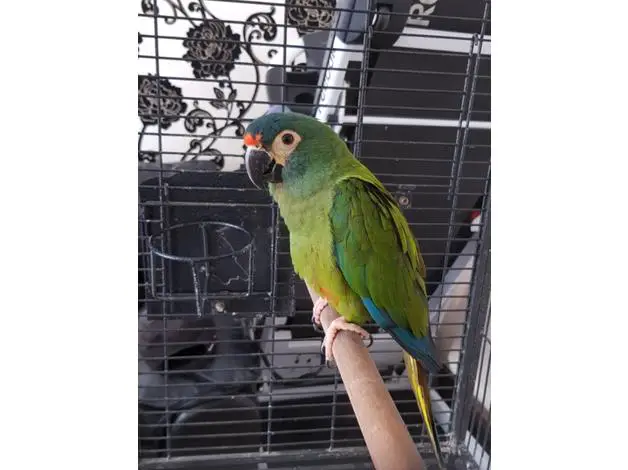
Keeping the Blue-Winged Macaw in a cage is actually pretty simple because this bird is not as difficult to handle as some other parrots are. For starters, you may need a standard parrot cage that is about at least 3 feet tall and 1.5 feet wide. This makes sure that your Blue-Winged Macaw will have enough space inside its cage. The cage should be made of steel so as to make sure that it is as sturdy as possible. There are plenty of cages for parrots and macaws in bird specialty pet stores. Always remember that these birds love to fly. That means that it is very important to have it live in a cage that has enough space for it to spread its wings and fly around.
The Blue-Winged Macaw is a very intelligent parrot and will be able to learn how to bust out of its cage if you are not too careful and if the cage has a very simple locking mechanism. To that end, make sure that you go for a cage that can only be opened from the outside so that the parrot won’t be able to learn how to open it from the inside in case it wants to bust out of its enclosure. You can also go for cages with a double locking mechanism for good measure. In any case, you should never underestimate how intelligent the Blue-Winged Macaw is.
Decorating the Blue-Winged Macaw’s cage is a very important part of making sure that it gets to live in an environment that is suitable for it. This bird is very intelligent and requires constant mental stimulation so that it will not get bored. So, to that end, give it different types of toys that can help keep its mind working hard every minute. Puzzle toys for birds can be a good idea if you want to make sure that your Blue-Winged Macaw does not get bored and that it gets distracted whenever you are not around to interact with it. Chew toys are also great for your parrot because these birds can get destructive at times. So if you want to prevent it from trying to destroy whatever is inside its cage or whatever it seems, if you give it time to spend outside its cage, you better provide it with enough chew toys. Similar to their food, the Blue-Winged Macaw’s toys should be rotated often because they will easily get bored if you give them the same toy over and over again.
Availability – Where to Get One?
Before you try to get yourself a Blue-Winged Macaw, make sure that you have already considered everything you need to consider when owning a parrot such as this. That means that you should have already factored in the expenses for its food, cage, toys, and medical bills. If you think you are unable to shoulder such burdens, you probably should not keep a Blue-Winged Macaw because they can be pretty demanding in terms of time, money, and effort on your part.
Blue-Winged Macaws are not exactly easy to find in the pet trade because it can be quite rare when compared to other mini parrots and macaws. You may want to do some deep digging if you want to secure yourself a Blue-Winged Macaw. Their numbers are not as great as other parrots due to deforestation, climate change, and hunting, but you may still be lucky enough to find one in an online specialty store that caters exotic birds.
How to Care for a Blue-Winged Macaw?
Blue-Winged Macaws are said to be the ideal types of parrots to have as a pet because they are caring, friendly, sociable, and endearing to have by your side. But that does not mean that they are the easiest pets to take care of. The Blue-Winged Macaw may demand as much of your time and effort as any other type of pet because of how they require attention and interaction on your part.
The first thing you need to keep in mind when caring for a Blue-Winged Macaw is to make sure that you provide it with a good and clean cage that is perfectly suitable for a bird of its kind. The size should be just right, and it should have all the necessary furnishings and toys it needs. On top of that, you should always make sure that the cage is clean and free from any droppings so as to minimize the onset of bacteria and other types of harmful infections.
Another thing that is just as important is to make sure that you interact with your Blue-Winged Macaw because these sociable birds require a lot of attention and interaction from your part. You can play with it from time to time and teach it some tricks. Talking to it can also be very interesting as this parrot can pick up a few words. What is very important to take note of is that the Blue-Winged Macaw is a compassionate companion and will be able to understand what you are feeling in certain situations. In such cases, this parrot will also mirror your usual demeanor. So, if you are always sad and down, you can expect your Blue-Winged Macaw to have the same kind of temperament.
FAQ Section
What food should I feed my Blue-Winged Macaw?
Blue-Winged Macaws are primarily herbivores. They are best fed with different sorts of greens, vegetables, grains, fruits, and nuts but should be kept away from chocolate, coffee, and avocado.
Are Blue-Winged Macaws ideal pets?
If you are considering their identity as friendly and compassionate pets, then the Blue-Winged Macaw is an ideal parrot to have, especially for those who want to have pets that love interacting and playing with their owner.
Are Blue-Winged Macaws playful birds?
The Blue-Winged Macaw is a very playful bird that loves to socialize and interact with people because of how friendly it is. In any other case, it also loves playing alone so long as you provide it with all sorts of different toys that can capture its attention and will allow its mind to work.
Are Blue-Winged Macaws noisy parrots?
Blue-Winged Macaws are not the noisiest types of parrots and are most likely going to sound more like crows from time to time. However, they can pick up certain sounds and may repeat them from time to time but not to the point of producing annoying and irritating noises.
Are Blue-Winged Macaws capable of talking?
The Blue-Winged Macaw is one of the many species of parrots that are capable of mimicking human speech. They are not really the best when it comes to doing such, but they can actually pick up a few words and even talk to you with some of the wittiest types of answers.
Do Blue-Winged Macaws eat meat?
Generally, probably all species of birds are omnivorous eaters and can eat meat. In that case, it is safe to assume that the Blue-Winged Macaw can eat meat, but the consensus is that this parrot leans more towards its herbivore side as its diet is dominated by vegetables, grains, fruits, and nuts rather than meat-based food.
How long do Blue-Winged Macaws live?
Blue-Winged Macaws get to live for more than 45 years when they are kept in captive care, but there have been some that we’re able to live past 50 years of age and even reach six decades. However, such cases are rare.
